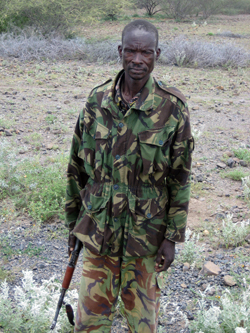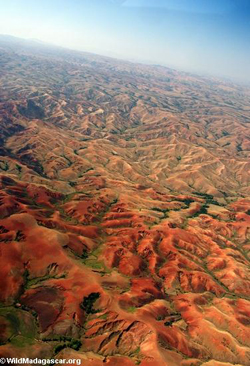Could carbon credits-for-forest conservation (REDD) reduce terrorism and global warming?
Could carbon credits-for-forest conservation (REDD) reduce terrorism and global warming?
mongabay.com
December 20, 2007
|
|
Schemes to offer carbon credits for reducing deforestation rates in developing countries could improve American security by providing stable income to disaffected rural groups, argues a new Council on Foreign Relations report on the impact of climate change on U.S. national security.
Report author Joshua W. Busby of the LBJ School of Public Affairs at the University of Texas-Austin says that plans to include Reducing Emissions From Deforestation and Degradation (REDD) mechanisms to international climate change mitigation efforts might have the unintended effect of reducing political instability in rural areas. As an example, Busby cites recent developments in the Indonesian province of Aceh where Governor Irwandi Jusuf, a former rebel who was one of only 40 survivors after the December 2004 tsunami struck the prison where he was incarcerated, has become one of Indonesia’s leading supporters of forest conservation funded through carbon credits.
“Indonesia’s political instability has fostered terrorist groups that may have global ambitions,” he writes. “Managing forestry payments deftly could help to solidify Indonesia’s social order and discourage radicals. In Aceh, for example, the provincial government, led by a former rebel, is seeking support for avoided deforestation as a means of persuading former separatists to protect the forests and refrain from picking up their guns; providing him with the resources he seeks could mitigate both climate change and separatism.”

Photo by Rhett A. Butler |
Busby says that such stability, even in the far reaches of Indonesia, can help reduce risk to Americans.
“The U.S. needs to consider how instability in countries overseas could have national security implications for the United States and whether and how avoided deforestation could play a role in diminishing those risks,” he told mongabay.com. “In terms of U.S. security interests, some unstable countries could become ‘ungoverned spaces’ for anti-American and anti-Western groups to organize attacks. Alternatively, we might see some countries become unstable and sites of internal conflict with large-scale humanitarian problems such as refugees. In these circumstances, the United States, other countries, and the UN may be called on to send troops or logistical support for peace-keeping or relief.”
“It would be far less costly if the international community invested in avoided deforestation to provide poor, developing countries with sustainable sources of revenue rather than reactive military intervention. While it may take a special set of circumstances for avoided deforestation programs to play this important stabilizing role, those situations, like Indonesia, may be particularly significant, both in terms of U.S. national security interests and also for tropical forest conservation.”

A national security risk? Photo by Rhett A. Butler |
Busby says that while avoided deforestation programs are probably best initiated in countries with relatively good governance, the mechanisms could eventually be extended to regions like the Congo where civil strife is still an ongoing concern. Still, he adds, proper oversight to ensure that proceeds from forest carbon offsets actually reach rural populations will be key to successful implementation of REDD initiatives.
“I think it will be especially important to get the compensation mechanisms right. Because so much money ostensibly could be at stake, the pilot project from the World Bank and the subsequent market mechanisms need to make sure that distributional conflict over the resource flows don’t undermine the potential for these funds to provide much needed resources to developing countries,” Busby explained to mongabay.com. “I was dismayed that the U.S. did not offer anything to the World Bank’s pilot program on deforestation and that it plans on cutting funding for the Tropical Forest Conservation Act. In the same way that it has failed to contribute to GEF adaptation funds, the U.S. is demonstrating by its lack of participation and support that it really is not serious about mitigating the problem or assisting other countries in dealing with the effects.”
“If countries like Indonesia are to benefit and if savings from avoided emissions from forestry are to materialize, the United States must play an active role in addressing the remaining technical issues and ensure the pilot program is fully funded,” he writes.

Author Joshua W. Busby |
Elsewhere in the paper, titled Climate Change and National Security – An Agenda for Action, Busby argues that the U.S. needs to strengthen national security by reducing vulnerabilities to climate disasters through measures including “no regrets” policies on climate change; investments in infrastructure; disaster risk reduction and adaptation, climate change diplomacy; and institutional reforms such as integrating climate security into the National Security Strategy.
“Domestically, extreme weather events made more likely by climate change could endanger large numbers of people, damage critical infrastructure (including military installations), and require mobilization and diversion of military assets,” said Busby. “The policy proposals presented here—have the potential to strengthen national security by reducing U.S. vulnerabilities to climate change at home and abroad, securing and stabilizing important partners, and contributing to other goals such as energy security and industrial revitalization. In a world of new security challenges, forging a climate policy along these lines must be a national priority,”
The report: Climate Change and National Security – An Agenda for Action
Comment on this article
Related articles
Bali delegates agree to support forests-for-climate (REDD) plan
(12/16/2007) Delegates meeting at the U.N. climate conference in Bali agreed to include forest conservation in future discussions on a new global warming treaty, reports the Associated Press. The move could lead to the transfer of billions of dollars — in the form of carbon credits — from industrialized countries to tropical nations for the purpose of slowing greenhouse gas emissions by reducing deforestation rates. Deforestation presently accounts for roughly 20 percent of anthropogenic emissions worldwide.
Could the carbon market save the Amazon rainforest?
(11/29/2007) The global carbon market could play a key role in saving the Amazon from the effects of climate change and economic development, which could otherwise trigger dramatic ecological changes, reports a new paper published in Science. The authors argue that a well-articulated plan, financed by carbon markets, could prevent the worst outcomes for the Amazon forest while generating economic benefits for the region’s inhabitants.
Carbon offset returns beat forest conversion for agriculture in Indonesia
(11/21/2007) Conversion of forests and peatlands for agriculture in Indonesia has generated little economic benefit while releasing substantial amounts of greenhouse gases into the atmosphere, reports a new study from the the World Agroforestry Centre (ICRAF), the Center for International Forestry Research (CIFOR) and their Indonesian partners.
Aceh, Papua, Amazonas governors sign carbon-for-forests pact
(12/08/2007) Three governors have signed the Forests Now Declaration to protect tropical forests for their carbon value. The Governors, Irwandi Yusuf (Aceh, Indonesia), Barnabas Suebu (Papua, Indonesia), and Eduardo Braga (Amazonas, Brazil), agreed to the declaration’s action plan which calls for compensation for reduced greenhouse gas emissions from deforestation and protection of standing forests. Deforestation and forest degradation account for roughly 20 percent of human-caused greenhouse gas emissions, but steps to reduce forest loss will help mitigate climate change. The UK government’s 2005 Stern Review said that forest protection could be one of the most cost-effective ways to address climate change.
Carbon offset returns beat forest conversion for agriculture in Indonesia
(12/07/2007) Governors from the Brazilian state of Amazonas and the Indonesian provinces of Aceh, Papua and West Papua signed a historic agreement to protect threatened rainforests. The pact, which imposes a logging moratorium in their states and provinces, was signed in Bali, Indonesia, where more than 10,000 policymakers and scientists are meeting to discuss measures to reign in greenhouse gas emissions responsible for global warming.
REDD will fail if needs of forest communities aren’t addressed
(12/07/2007) Initiatives to reduce emissions by reducing tropical deforestation (REDD) will fail unless policymakers adequately address the underlying drivers of forest degradation and destruction, argues a new report published by the Center for International Forestry Research (CIFOR).
Merrill Lynch announces carbon credits-for-forest conservation partnership
(12/06/2007) Merrill Lynch is working with Carbon Conservation, an ecosystem services firms, to explore opportunities in avoided deforestation and integrated sustainable land management. The partnership was announced Thursday in Bali, Indonesia, where more than 10,000 policymakers, scientists, and activists are meeting to discuss a post-Kyoto framework on limiting climate change.
Carbon for forests will help Aceh recover from war, tsunami
(9/18/2007) Carbon credits through forest conservation will play an important role in Aceh’s recovery from decades of civil war and the devastating 2004 tsunami, which left more than 167,000 people dead and 500,000 homeless in the Indonesia province, said Aceh governor Irwandi Jusuf in meeting in San Francisco.